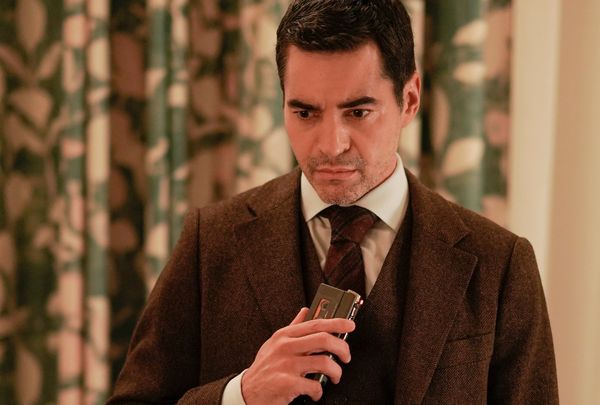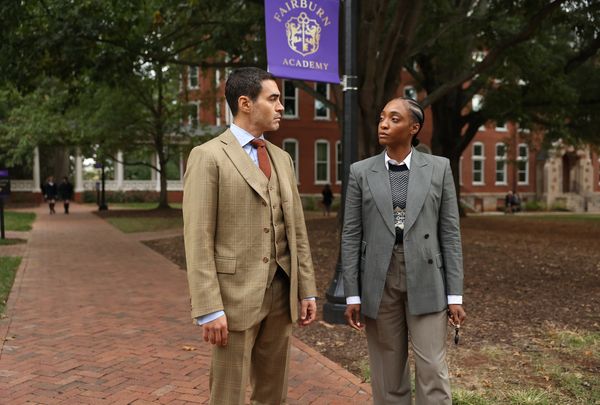What popular culture like “Will Trent” gets wrong about dyslexia, and why it matters
Trent #Trent

This past weekend, I sat down with a glass of wine to watch “Will Trent,” the ABC series about a detective (Ramón Rodríguez) who sees things others don’t. Will Trent’s secret weapon in crime fighting is his dyslexia. I wanted to watch because, as a dyslexic myself, I was curious about the show’s portrayal of the learning difference. Was it just another shtick, or an authentic effort to bring nonlinear thinkers into the fold of popular culture?
Dyslexia is not illiteracy. Dyslexics can read, it’s just that their brains don’t do so linearly.
Imperfect main characters using their differences as crutches are hardly a new trope. Monk, the uncannily perceptive detective with OCD, did it moons back. “The Good Doctor” tried autism on for size. While seeing dyslexia featured in popular culture is a step in the right direction, we should be mindful of how the dyslexic experience is portrayed. Creative liberties taken at the expense of the truth can be dangerous. They shroud the learning difference, already misunderstood by many, in mystique and misinformation.
In “Will Trent,” the pendulum mostly swings to the extremes: either dyslexia is portrayed as a disability or it’s a gift. The truth is somewhere in the middle. Dyslexia isn’t a gift. Nothing is, if you don’t have the tools to harness it and use it to your advantage. It’s hard to believe that Will Trent, an accomplished detective, doesn’t yet have his workarounds. For example, he’s totally stymied by the task of reading a name on a flier, and can’t tell the difference between “Push” and “Pull” on a door.
But dyslexia is not illiteracy. Dyslexics can read, it’s just that their brains don’t do so linearly, like a non-dyslexic’s might. Dyslexia is also not writing your E’s and K’s backwards – that’s dysgraphia – and there’s actually no evidence that dyslexics flip or reverse letters. Young children might write their letters flipped, but most adult dyslexics wouldn’t still be struggling with that particular task. Finally, Will Trent owns an ancient flip phone, presumably to avoid the complexity of the modern iPhone – really? I assure you, dyslexics are just as beholden to, and capable of navigating, modern technology as the next person.
But “Will Trent” does get some important things right. Will seems ashamed of his diagnosis, doing his best to hide it from his partner and coworkers. “I forgot I’m an idiot and it takes an hour to read a damn sentence,” he says to Angie (Erika Christensen), his on-again, off-again love interest. I’d bet most dyslexics have felt that way. I certainly did. Because of the words that we sometimes use to talk about dyslexia — disability, disorder, diagnosis — it’s easy for most to see it as a drawback and associate it with lower intelligence. In fact, some of the greatest thinkers of our time are dyslexics who have found a way to work around their language processing problems by highly developing other skills, such as memory, visualization, imagination or observation.
Some dyslexics excel in arts, design, and music … they strengthen their ability to speak in a whole different language.
Many dyslexics end up “compensating” for their trouble with language processing by doing other things really well – things that don’t come naturally to the linear mind. California Governor Gavin Newsom, a fellow dyslexic, said that he struggled with reading so much that he trained his brain to remember. He credits dyslexia for his photographic memory. And that’s exactly what Trent has done: he seems to have a knack for visualization – Ramón Rodriguez, the actor who plays Trent, describes him as a puzzle master, reconstructing crime scenes in his mind’s eye.
Some dyslexics excel in arts, design, and music because, instead of written language, their brains think visually or audibly; they strengthen their ability to speak in a whole different language. My experience with dyslexia has been a process of accepting that, while I’ll never be great at reading and writing, my ability to visualize like Will — to think outside the box, to negotiate things that others take for granted, to challenge the status quo — has been the driving force behind my creative career. If I hadn’t had opportunities to explore this part of my brain as a young child, I might have dropped out of school, like so many dyslexic children who confront an inflexible learning environment that teaches down to them.
 Ramón Rodríguez in “Will Trent” (ABC)We see this story told, time and again, by countless artists, doctors, musicians, engineers, designers, lawyers and CEOs – that their success came in spite of an education system that labels them as slow, lazy, unenthusiastic or deficient, and failed to encourage their incredible strengths: innovation, imagination, visualization — things that are hard to teach. Trent acknowledges this himself: “Before I had dyslexia, you know what I had? Stupid. Lazy. Useless. . . I had to . . . learn how to navigate the world without words. Every step of the way, there was someone there to tell me that I was broken, worthless. I decided long ago that I’m not letting anyone look at me that way ever again.”
Ramón Rodríguez in “Will Trent” (ABC)We see this story told, time and again, by countless artists, doctors, musicians, engineers, designers, lawyers and CEOs – that their success came in spite of an education system that labels them as slow, lazy, unenthusiastic or deficient, and failed to encourage their incredible strengths: innovation, imagination, visualization — things that are hard to teach. Trent acknowledges this himself: “Before I had dyslexia, you know what I had? Stupid. Lazy. Useless. . . I had to . . . learn how to navigate the world without words. Every step of the way, there was someone there to tell me that I was broken, worthless. I decided long ago that I’m not letting anyone look at me that way ever again.”
It’s heartening that at the same time the narrative around dyslexia is changing, the words we use to describe it are, too. People are encouraged to say “learning difference” instead of “disability” — a good first step. But I want to take it further. When I talk about dyslexia, I call it a hyper-ability. That’s my lived experience, and the experience of many dyslexics who have been lucky enough to learn how to wield their dyslexia as a tool. Even though Will Trent fully uses his dyslexia as his on-the-job secret weapon, it’s disheartening that his language doesn’t yet reflect that: he refers to himself as an idiot, or says things like, “My stupid detective brain doesn’t have an off switch.” He doesn’t want others to see him as broken and he’s decided the best way to do that is to hide a language-processing issue, something that – in the grand scale of things – is probably a small fraction of his job.
I’d like to imagine a near future in which dyslexia is not heralded as a gift outright, dismissed as a disability, or hidden altogether, but rather recognized, with nuance. That’s why the way we talk about dyslexia in popular culture matters — why a show like “Will Trent” matters so much to dyslexics like myself. In Season 2, the showrunners must do a more realistic and complex job of capturing the dyslexic experience. For example, I’d imagine that Will feels flustered by the dysfunction of the police system he has to operate within. As a dyslexic whose brain makes seamless connections, sees the bigger picture, and is masterful at problem solving, there must be a massive amount of overwhelm that he deals with, every day, for example, at not being able to fix systemic issues. Connecting dyslexia to these deeper issues will give it context and depth – beyond just jumbled letters and flip phones – to a deeper acknowledgement that the dyslexic brain works differently.
 Ramón Rodríguez and Iantha Richardson in “Will Trent” (ABC)Myths and misunderstandings about dyslexia persist, causing many children and adults to struggle without a diagnosis and treatment. Seeing ourselves in popular culture, in positions of power and success, in characters such as Will Trent, is important. It lets dyslexics know that we’re ready, as a community, to understand the nuances around dyslexia. We need “Will Trent” to acknowledge that part of Trent’s arc – from ashamed of his dyslexia to motivated and energized by it – in the following seasons the way that many dyslexics do, in real life.
Ramón Rodríguez and Iantha Richardson in “Will Trent” (ABC)Myths and misunderstandings about dyslexia persist, causing many children and adults to struggle without a diagnosis and treatment. Seeing ourselves in popular culture, in positions of power and success, in characters such as Will Trent, is important. It lets dyslexics know that we’re ready, as a community, to understand the nuances around dyslexia. We need “Will Trent” to acknowledge that part of Trent’s arc – from ashamed of his dyslexia to motivated and energized by it – in the following seasons the way that many dyslexics do, in real life.
Finally, we need to be careful that, in our representation, we’re not turning dyslexia into a plot device without much basis in reality, a schtick that buries the learning difference in misinformation. We can use shows like “Will Trent” as an excellent launching pad for deeper discussions around learning differences — and how to create an environment in which they are celebrated, and dyslexics can thrive.
“Will Trent” airs Tuesdays at 10 p.m. ET on ABC and streams on Hulu.
Read more
about this topic